Salt for the dishwasher: what is it used for, how to apply + manufacturers rating
It’s not enough to choose, purchase and install a dishwashing machine in the kitchen. In order for her to qualitatively wash away the remains of food from cutlery, an automatic dishwasher needs detergents.
And if the water poured into it is also characterized by hardness (high in calcium and magnesium), then salt for a dishwasher of a special composition will be required. Without this tool, the dishwasher will not last long.
But what happens and how to use it correctly? We will consider these issues in detail in our material. We also highlight the best manufacturers on the market, supplying a quality product at an affordable price.
The content of the article:
Purpose of salt for the dishwasher
Regardless of the composition of the water, the dishwasher cannot be operated without salt. In any case, the equipment will turn on and will work, however, it will not last for a long time in this mode. Lime deposits are not immediately, but inevitably lead to failure of the existing inside the heater. We recommend that you familiarize yourself with operating rules dishwashers.
Do not confuse salt with detergent in “2 in 1”, “3 in 1”, “5 in 1” tablets, etc. Often the first is already contained in the second. However, this is far from a fact. Not all manufacturers add salt to their dishwasher soap.
Many of them make separate compounds - one for washing dishes, and the other for softening water. Everything is described in the product labeling and in the PMM instructions, it is worth examining this extremely important information.
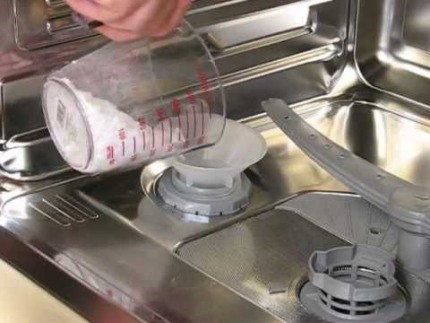
The salt intended for dishwashers has several functions:
- softens the water used when washing;
- restores the supply of sodium in the ion exchanger;
- relieves metal elements of washing equipment from scale (plaque);
- improves the quality of washing;
- protects dishes, and therefore the person using it, from limescale deposits.
All the reasons for the need to use salt in one way or another are aimed at softening the water entering the machine. Filters can also be used for this purpose. However, they are expensive to install and operate, and they do not always give the desired effect.
Salt tablets and powders have been specially developed for dishwashers to protect this technique from excess calcium and / or magnesium in the water supply.
To fully understand why you need to use salt in the dishwasher, you will need to familiarize yourself with construction and working principle dishwashers, as well as a little deeper into chemistry. So, tap water and well water contain a certain amount of ions of various metals and calcium. When heated, they precipitate in the form of a precipitate, which gradually compacts and creates scale.
The biggest problem from this “lime” is its build-up on the heating element heating water. Such growths are formed on the tubes of electric heaters, not only in dishwashers, but also in washing machines and boilers. As a result of the increase in scale, first the heater begins to spend more electricity to heat the water, and then at some point in it because of too high a temperature, the spiral burns out.
If you have a Bosch brand dishwasher and you have to replace the heater, we recommend that you look detailed instructions by choice and replacement.
To avoid such problems, manufacturers of dishwasher household machines began to put in them a special ion exchanger. The resin contained in it, consisting of sodium chloride, binds metal ions and prevents them from interconnecting for precipitation in the form of lime scale. In this way, all unnecessary is discharged into the sewer, and the water is softened.
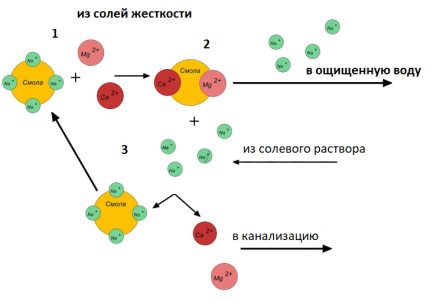
In order to replenish the contents of the ion exchanger in the "dishwasher-automatic machine" and add sodium salt. It is not for nothing that such salt formulations are also called regenerating or restorative. In fact, they are one of the mechanisms for extending the life of a heating element and a dishwasher in general.
All About PMM Salt Products
Many manufacturers produce the salts in question and their packaging options. The main feature of such compounds is its high purity. Initially, they do not imply the content of dyes, phosphates, chlorine and flavorings; they are almost entirely composed of pure sodium chloride.
Features of salt packaging
The sodium salt needed to soften the water is a small, colorless crystal. Many dishwasher detergents are sold in this powder form.
The technology of their production is as follows:
- extraction of common rock salt occurs (classic sodium + chlorine);
- the extraction of non-sodium mineral inclusions is cleaned;
- this powder is packaged in bags for shipment to stores.
Everything is extremely simple. The main thing here is a high degree of purification. Any blotches of anything else besides sodium bring only harm. All other chemical elements in heated water themselves become a source of scale. Therefore, it is strictly not recommended to use edible iodized or sea salt for backfilling into the machine.
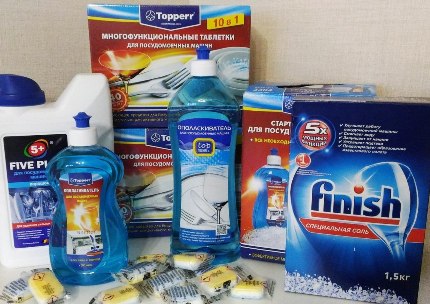
When choosing compressed tablets, in which, in addition to salt, “soap” is added immediately, special attention should be paid to the type of surfactants in the composition. It is best to take them with nonionic (nonionic) surfactants. They, unlike anionic analogues, are completely biodegradable and less aggressive.
Harm of impurities in the regenerating salt
Sodium-based regenerating salt products have been specially developed for dishwashers. They are needed for the correct, effective and safe operation of this equipment. Such salts contain only NaCl, which we all widely use in cooking.
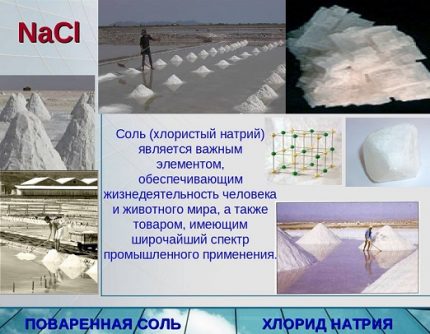
Only surfactants that are not washed off by water when rinsing can be dangerous. But these substances are contained only in tablets with detergents. If tableted or powder salt is in its pure form, then the drug is absolutely safe. In the process of washing dishes, it completely dissolves and is washed off without residue into the sewer.
Use of ordinary edible salt for backfilling into the ion exchanger is not recommended by manufacturers of equipment in their instructions. However, if it is well cleaned and free from impurities, then use is entirely possible. But it must be digested. Before pouring edible salt into the dishwasher, you need to carefully read what is written on the package with it.
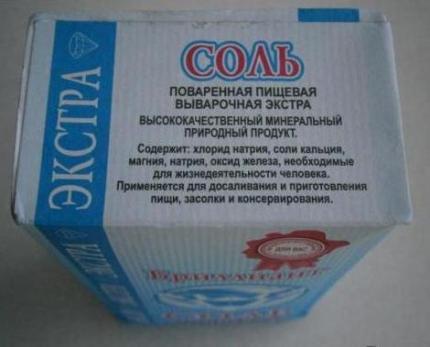
Sea salt with iodine contained in it is categorically not suitable for replacement. In this case, the abundance of additional ingredients will only worsen the situation with scale. It is allowed to use only NaCl, purified from impurities by boiling. Only he will not harm the dishwasher and soften the water as expected.
It is not worth using other formulations and preparations from the assortment of household chemicals. In them, sodium salt is in small proportions and always has many related ingredients.
If “EXTRA” is selected for replacement, it is recommended not to fill it in the ion exchanger, but to fill it in the form of a 1: 1 water-salt solution. This will avoid the formation of a compressed lump inside the compressed. If it forms, then the water in the ion filter will cease to flow and soften.
Dosage and Usage Nuances
The volume of salt needed and the rate of its consumption in PMM depend only on the hardness of soapy water. The harder it is, the more drug is consumed. Moreover, it is difficult to guess this indicator, it is constantly changing depending on the season of the year and the water utilities used to clean the contents of water supply systems and technologies.
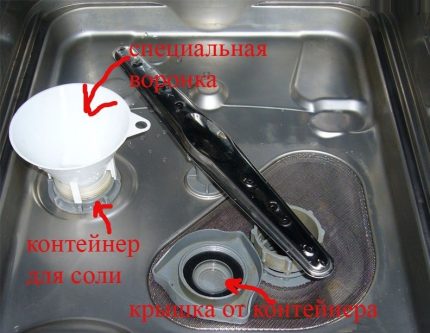
If the dishwasher is designed to use salt, then it has one of two things:
- Water hardness sensor.
- The lever for manually setting this parameter.
The technology for using these devices is always described in the machine passport.It may differ depending on the model. Read the instructions before turning on this washing technique, it just does not hurt.
Most often, it is recommended to pour salt from the scale directly with the beginning of the washing. Moreover, it is often necessary not only to pour it, but also to fill it with water for better preliminary solubility.
The main attention should be paid to the storage of this product. Sodium salt is very hygroscopic, as it becomes saturated with moisture, it loses its effectiveness. It should be stored in a dry place and away from sunlight, otherwise the water will still remain hard, as it was originally in the pipeline.
Rating of brands and manufacturers
Almost every manufacturer of dishwashers simultaneously produces salt and detergent compositions for them or recommends directly in the instructions for the machine to use the salt variant of a particular brand with a specific dosage.
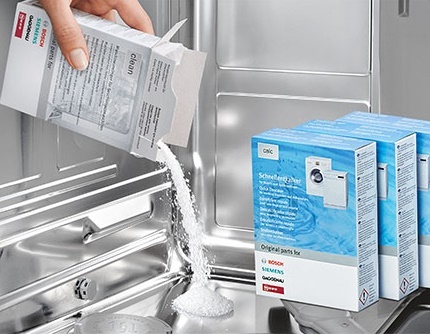
It is difficult to compile a full rating of salts for dishwashers with analysis of many different parameters. A similar composition is almost pure sodium chloride (usually the mass fraction of NaCl in them is 99.5–99.7%). To invent something special here is problematic.
In the tool in question, according to the standards, there should be no additives, rinses, impurities and detergents. If something like that is in the description of the composition, then this is not an active salt for the ion exchanger, but the usual dishwashing detergent in an automatic dishwasher such as “3 in 1”, “5 in 1”, “ALL in 1”, etc. . Such tablets and powders are placed in a completely different compartment in the dishwasher.
The best option for a regenerating salt is large crystals of NaCl. The powdered analogue of fine grinding is consumed too quickly, it is better to bypass it in the store. You need to look for a salt product in the form of granules with a minimum size of 4-6 mm. Pills in this regard are also good, but not every ion exchanger can be laid at the same time in the required quantity.
1st place - Finish Calgonit
Finish Calgonit took first place due to the almost complete absence of negative feedback from housewives on products under this brand. By value, this salt is in the middle price segment.
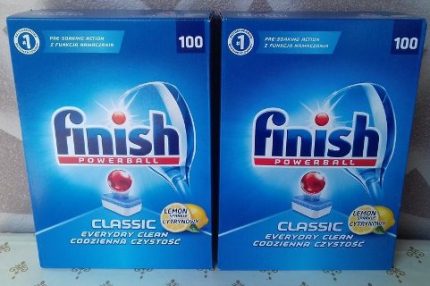
This manufacturer also has a dishwashing detergent. We talked more about brand products in this stuff.
2nd place - Sodasan
Sodasan is not inferior to Finish Calgonit in purity of sodium chloride, but costs a little more.
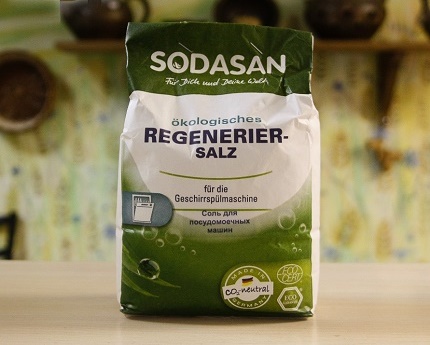
3rd place - Somat
Somat is characterized by high salt purity and the absence of any impurities in it. However, crystals in the packaging of this manufacturer are smaller than others.
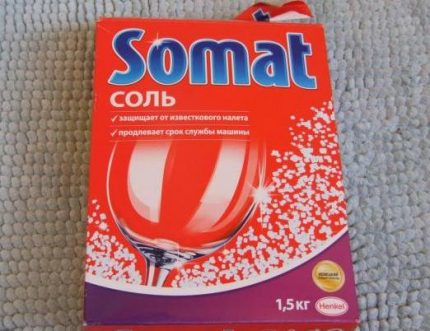
The final third place - Somat is a classic middling.
In addition to salt in the assortment of this manufacturer are highly effective tableted funds for washing dishes.
4th place - Eonit
Under the Eonit brand, there are two types of descaling salts on the market: regenerating NATURAL and CLEANVON.
The first product is positioned as made from natural raw materials, and the second with 99.9% purification. But the naturalness of NaCl is a big question.
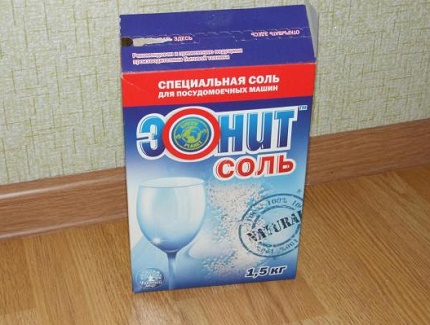
At the same time, the price of both options is closer to 100 rubles / 1.5 kg.Fourth place for the availability of different products in the line and budget cost.
5th place - Top House
Closes the top five ranking Top House. These are the largest crystals among competitors, but the high price. There is enough such salt in the ion exchanger for a long time.
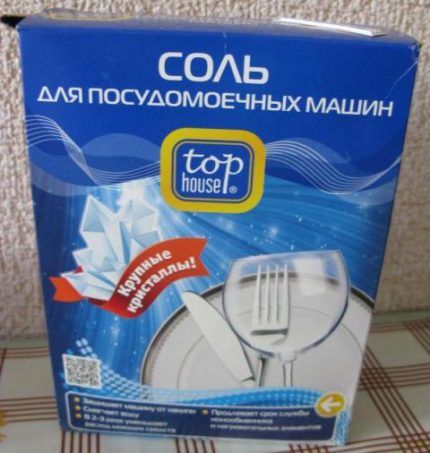
In all cases, a pack of salt of 1.5 kg will have to pay about 100-250 rubles. The price depends on the region, seller and ongoing promotions with discounts.
If a cheaper product under a different brand with a price below 100 rubles is offered, then it is worth taking it with caution. Cheapness here is the first sign of too small granules or a low degree of purification of sodium chloride. As a result, you pay less for salt, but it will quickly be consumed or will damage the washing machine.
Conclusions and useful video on the topic
To simplify the choice of salt preparations for PMM, we offer a small selection with video materials. They described in detail about all the nuances of using salt.
What you need to know about salt formulations for automatic dishwashing:
The significance of the use of salt from scale:
How can I replace branded salt for automatic PMM:
Salt from scale is a necessary and often prerequisite for the proper operation of the dishwasher. When buying such a technique, one must be prepared to constantly purchase consumables for it in the form of detergents and salt tablets or powders. Without the latter, scum will quickly begin to accumulate inside the PMM, which will inevitably lead to breakdown of the automatic dishwasher.
Do you have questions about the use or appropriateness of buying and using salt for your dishwasher? Ask them to our experts under this article.
If you want to share your personal experience with using salt of a particular brand, write your opinion in the comments section, indicate the advantages and disadvantages of the chosen product, the form that is most convenient for you, add unique photos of the package.

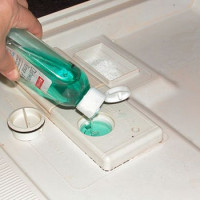 Rinse aid for dishwasher: ranking of the best manufacturers
Rinse aid for dishwasher: ranking of the best manufacturers 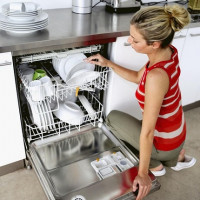 Which dishwasher detergent is better: high-performance detergent rating
Which dishwasher detergent is better: high-performance detergent rating 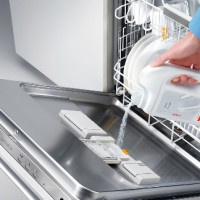 Powder for dishwasher: rating of the most effective means
Powder for dishwasher: rating of the most effective means  Built-in dishwashers 45 cm wide: ranking of the best models and manufacturers
Built-in dishwashers 45 cm wide: ranking of the best models and manufacturers 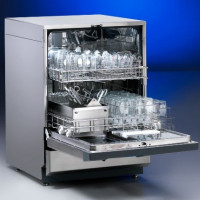 The principle of operation of a typical dishwasher: design, main components, operating rules
The principle of operation of a typical dishwasher: design, main components, operating rules 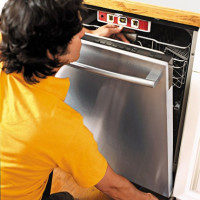 The first start of the dishwasher: how to properly carry out the first inclusion of equipment
The first start of the dishwasher: how to properly carry out the first inclusion of equipment 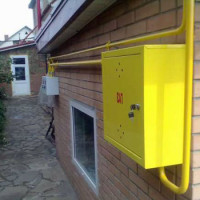 How much does it cost to connect gas to a private house: the price of organizing gas supply
How much does it cost to connect gas to a private house: the price of organizing gas supply  The best washing machines with dryer: model rating and customer tips
The best washing machines with dryer: model rating and customer tips  What is the color temperature of light and the nuances of choosing the temperature of the lamps to suit your needs
What is the color temperature of light and the nuances of choosing the temperature of the lamps to suit your needs  Replacement of a geyser in an apartment: replacement paperwork + basic norms and requirements
Replacement of a geyser in an apartment: replacement paperwork + basic norms and requirements
When we bought our first dishwasher, about 5 years ago, no one warned us that salt was needed for it. As a result, she served a little, covered with ten, it was a large raid of lime. With a new one this is not permissible, salt for the dishwasher was bought immediately. Now, of course, the most famous Finish Calgonit, but it is also the most expensive. We take others, they manage just as well, I like salt from Eonit. My question arose here, who knows: is it necessary to drive the dishwasher from time to time with lemon or is there enough salt?
Eugene, salt and citric acid are chemicals of different groups and their purpose is different. Salt is needed to soften hard water so that lime deposits do not appear on dishes and dishwasher elements.
Citric acid is used as a "heavy artillery" in the fight against deposits, especially with fat. Salt needs to be used constantly. It can be spent very economically, literally up to 500 grams. per year, if the water is soft and the PMM settings are correctly set. Citric acid is recommended every 1-3 months to remove fat and calcium deposits.By the way, instead of lemons, it is better to use specialized chemicals created for PMM.
You can read more about such tools in this article. It is these chemicals that machine manufacturers recommend.
I also used Calgon for the dishwasher, but for me, the method with the usual salt, dissolved 1: 1, is probably more effective. Because I think that there is less chemistry and thus cleansing and washing is a more natural means. It’s not for nothing that our grandmothers brushed their teeth not with toothpaste, but with salt. From ancient times it is known that salt kills bacteria, disinfects and removes plaque. If it fits the teeth, then it is definitely suitable for a dishwasher.
My wife and I are looking at buying a dishwasher, but I heard about salt for the first time. By the way, the question arose about the digestion of salt. In what sense should it be digested? How it's done?
Nikolai, dishwasher manufacturers categorically forbid using ordinary table salt. Conventional table salt contains impurities, including calcium salts, which are harmful to PMM pumps, filters, and electronics. Specialized salt for PMM - 99% consists of sodium chloride, NaCl. You can compare table salt and specialized with saline and ordinary water (saline is a solution of sodium chloride with distilled water). Evaporation of sodium chloride will lead to a decrease in pure NaCl and an increase in the content of harmful impurities, since at high temperatures, lighter substances are the first to volatilize. Sodium salts are always lighter than calcium (remember the periodic table - sodium 11 element, calcium - 20).
Of course, when using table salt 1-2 times, nothing will happen to the machine, but with constant falling asleep of such salt, mineral deposits are guaranteed. Special salt for dishwashers costs a penny - from 70 rubles per 1.5 kg, so such dubious savings are an unacceptable option.
I use Finish All in 1 gel for my Indesit dishwasher. 1 tablespoon is enough for one sink, it's just cool! The dishwasher is very spacious and has been serving for more than 5 years.
For more than 10 years I have been using ordinary table salt in my dishwasher. Saved perhaps half the cost of the car during this time. Nothing's broken. Learn chemistry gentlemen and do not get fooled by the “special salt” for dishwashers, the composition of which is the same NaCl as in salt for 10 rubles.
Ordinary salt is poured with boiling water, mixed until completely dissolved. and merges from above. At the bottom of the dishes there is a sediment, in the form of gray dirt, it is thrown away. So we get pure boiled salt. You can still strain the solution for greater importance, but I just let the precipitate settle.
Hello. What will happen if enough soft water is used in the dishwasher, but saline is still added?
I bought a PMM. Sea issues. I read comments. Porridge. It’s possible, but it’s done. That is impossible, but they do.
How much salt do you need to fill in and how often? Why can’t you wash the dishes with dishwashing gel? Can I put baking soda? thank